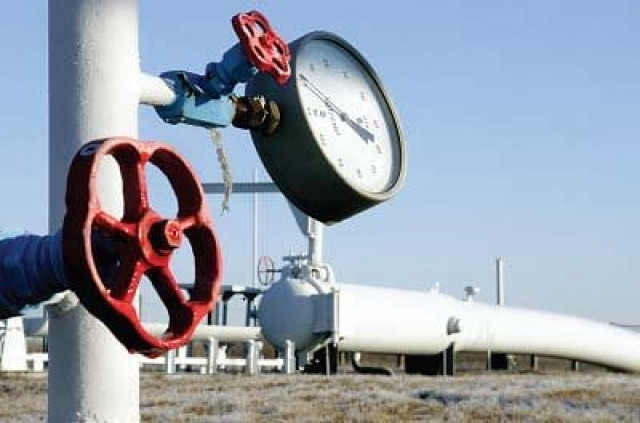SSGC eyes substitution plan amid depleting reserves
Explores closed wells and tight gas amid LNG affordability concerns

Sui Southern Gas Company Limited (SSGC) is awaiting the government’s approval signal to create a cost-effective gas import substitution of over $1 billion a year. This strategy involves reutilising closed wells and encouraging exploration firms to discover tight gas. The move comes as imported gas (Liquefied natural gas) has become unaffordable due to massive rupee devaluation in recent times.
While briefing journalists at his office, SSGC Managing Director Imran Maniar highlighted the challenges associated with completing international gas pipeline projects. Projects like the Turkmenistan-Afghanistan-Pakistan-India (TAPI) and Iran-Pakistan (IP) lines are proving to be “very, very tough”. Additionally, gas prices through these pipelines have risen beyond domestic consumers’ purchasing power.
Maniar stated that supplying low-cost indigenous gas to industries is no longer feasible for SSGC. Therefore, blending imported gas (LNG) has been proposed as a way forward.
Furthermore, the supply of gas to SSGC from local fields is projected to further deplete to 500 mmcfd (million cubic feet per day) in the next four years, declining over 30% by 2028 from the current 720 mmcfd, he added.
The gas marketing firm was receiving 820 mmcfd from local fields this time last year, marking a 12% reduction to date. This decline is attributed to depleting domestic reserves of oil and gas, with no significant discoveries in the past two decades.
Maniar revealed that SSGC has identified closed wells with the potential to supply a total of 200 mmBtu (million British thermal unit) in the system. Reactivating these wells could save $80 million a month and $1 billion annually in gas imports, he said.
Oil and Gas Development Company (OGDC), Pakistan Petroleum Limited (PPL), Pakistan Oilfields Limited (POL), and Mari Gas have closed wells due to production costs exceeding the selling price of $6/mmBtu. Reactivating these wells would require an additional investment of up to $50 million. However, even with increased costs of $7-7.5/unit, SSGC could sell gas to local industries at $8.5-9/unit, which is still lower compared to imported LNG sold at $15-16/unit, said the MD.
The caretaker government has also approved a tight gas policy, offering $7/mmBtu to exploration firms compared to $6/mmBtu for natural gas at present. This policy aims to tap into tight gas reserves estimated at 25 trillion cubic feet, nearly double the reserves of Sui gas currently standing at 13 trillion cubic feet.
Read SSGC seeks hike amid Rs47b shortfall
Maniar stressed the need to encourage exploration firms by offering competitive prices, suggesting a rate of $7-8/unit to reduce import burdens and lower gas prices nationwide.
Pakistan currently imports 11-12 cargoes of LNG a month. The proposed solutions could potentially cut imports by 3-4 cargoes a month, according to SSGC MD.
“Our local exploration firms lack the expertise and technology to find the tight gas. The policy should encourage foreign firms to return to Pakistan along with their external investment,” he suggested.
Additionally, Maniar proposed the introduction of a coal-to-gas policy, leveraging Pakistan’s vast coal reserves in Tharparker to potentially produce 1,200 mmcfd, exceeding current natural gas supplies. While gas prices through IP and TAPI pipelines could overcome gas supply shortfalls, Maniar cautioned that residential consumers may find it unaffordable, highlighting its suitability for industries.
He also mentioned that gas marketing companies were paying local oil and gas exploration firms in US dollar-denominations instead of in rupee-value, contributing to increased costs due to recent rupee devaluation against the greenback. Regarding subsidised gas for fertiliser manufacturers, Maniar suggested ending subsidised gas sales to them and instead providing direct subsidies to farmers.
PPL, Mari find POL products
In related news, Pakistan Petroleum Limited (PPL) announced significant discoveries in the Hala Block, including 6 mmcd of gas and 452 barrels per day of oil from development well Adam 2.
“The development well will add hydrocarbon reserves, enable the energy sector to reduce the gap between the supply and demand of oil & gas during the current energy crisis in the country and will save significant foreign exchange for the country,” said a notification to the Pakistan Stock Exchange.
This discovery, a joint venture between PPL and Mari Petroleum, with 65% and 35% working interest.
Published in The Express Tribune, February 14th, 2024.
Like Business on Facebook, follow @TribuneBiz on Twitter to stay informed and join in the conversation.



















COMMENTS
Comments are moderated and generally will be posted if they are on-topic and not abusive.
For more information, please see our Comments FAQ